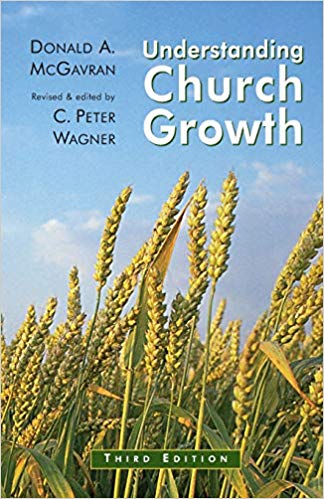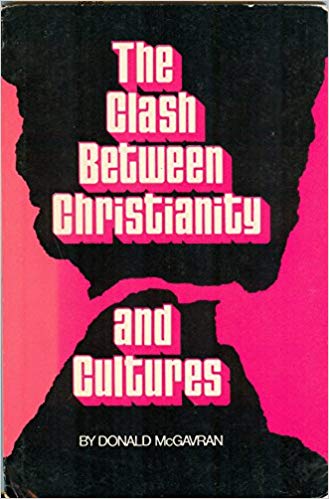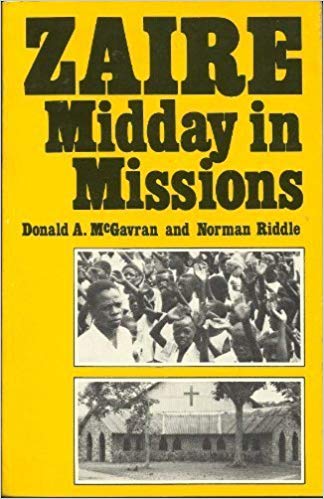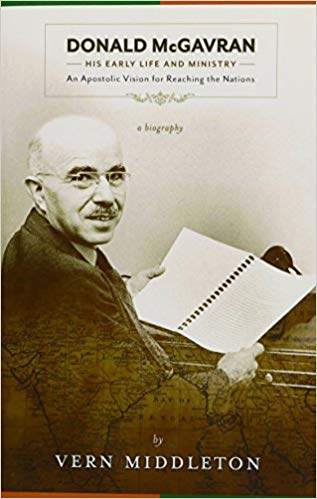Born December 15, 1897 to missionary parents in Damoh, India, Donald McGavran was the third generation of missionaries in his family. His family returned to the United States in 1910 and he attended school in Oklahoma and then Indiana. He was saved and baptized at the age of 14 in Tulsa, Oklahoma, where they attended First Christian Church.
Once he finished high school, he went to Butler University, from which he earned a B.A. degree in 1920. During his time of studying at Butler, he had a time when he felt like his father’s work was sufficient and Donald should focus on himself. This thought process turned out to be short-lived.
His education continued at Yale Divinity School from which he received a B.D. in 1922. He continued to earn a Master’s degree in 1923 from the College of Mission in Indianapolis, and, later, a Ph.D. from Columbia University in 1936.
McGavran went to France in the U.S. Army during World War I.
It was at a YMCA conference in Lake Geneva, WI, in 1919 that McGavran surrendered to mission work. He married Mary Howard in 1922, and a year later they returned to India as missionaries under the United Christian Missionary Society. The mission school system in Harda, India, became his responsibility and he was appointed to be the director of religious education for India in 1927. He was expected to standardize the curriculum and the instruction.
However, McGavran’s time in India was not only spent in evangelism. He also fought with wild animals, climbed the Himalayas, and helped to end an epidemic of cholera.
During his furlough eight years later, McGavran earned his Ph.D. in Education before returning to India to continue his work. He worked with eighty missionaries in his position as executive secretary of mission, while overseeing schools and hospitals, including a leprosy hospital and home which he supervised.
Donald McGavran translated the Gospels into the Chattisgarhi dialect of Hindi, after becoming an expert on the Hindi language.
During the time the McGavran family spent in India, Donald noticed that some areas were seeing a faster spread of the Gospel than others. Overall, he determined that the results were small in relation to the amount of money being spent for the mission. He was sure there must be a way to produce better results.He studied this phenomenon and identified things that acted as barriers to the spread of the Gospel and also looked at socioeconomic factors and how they related. He encouraged reaching whole families rather than individual people one at a time. Around the same time, he discovered J. Waskom Pickett, whose study of “Christian mass movements” was a part of his own study. He read a book that Pickett has written and used some of the principles he found there in his own work.
McGavran and his family, which included six children of which five were daughters, spent over thirty years in India doing God’s work. In 1954 they returned to the United States for furlough, but despite their original intention to return to India, they did not. They continued to serve the mission by researching church growth of mission churches worldwide. Some of the areas were in Thailand, the Congo, Puerto Rico, Jamaica, and the Philippines, as well as many other countries.
The factors he considered of the churches in his research included why a growing church was growing, what things prevented natural vitality and growth of a church, and what principles found in growing churches could be used to increase growth in other churches. He went on to teach and write about church growth and development and developed the theory of homogeneous units, or people units, within a church.
Because of the research and information McGavran put together, he was known as the Father of Church Growth. He founded the Institute of Church Growth in 1957 in Eugene, OR, and in 1965 he started the School of World Mission at Fuller Theological Seminary. He spent ten years, 1971-1981, as senior professor of missions at Fuller.
He also traveled around the country, teaching and speaking about the things he had learned throughout his experience in mission work. This continued even after he retired from Fuller. The concepts he isolated and the principles he taught are still being used to teach and encourage people effective ways to share the Gospel both at home and abroad.
Donald McGavran died of cancer at age 93, in July 1990, just three months after his wife. He wrote many books, of which the two recognized as most influential were Understanding Church Growth and The Bridges of God.
McGavran wrote nearly twenty books, as well as articles for newsletters. Many of these are still available.
Understanding Church Growth
Published first in 1970, this book by Donald McGavran examines the research he conducted and the insights he discovered that look at how and why church growth can be achieved.
The Bridges of God
This study in the strategy of missions was written and published in 1955 to encourage Christians in how to reach others and grow the church of God.
Effective Evangelism: A Theological Mandate
This book about sharing the Gospel was written by Donald McGavran and published in 1988.
The Clash Between Christianity and Cultures
This book was published in 1974.
Zaire: Midday in Missions
Donald McGavran and Norman Riddle co-authored this book about mission work in Africa in 1979.
You can read more about Donald McGavran in these biographies.
Donald A. McGavran: A Biography of the Twentieth Century Premier Missiologist
Written in 2015, this biography tells about the life and impact of McGavran.
Donald McGavran, His Early Life and Ministry
This book discusses both the life and vision of McGavran for reaching the lost and growing God’s family.









